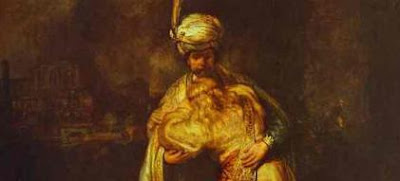 Today, as I turned a corner while driving the kids and I to the swimming pool, I found myself pondering David and Jonathan—and wondering if David’s life would have been different if Jonathan had lived.
Today, as I turned a corner while driving the kids and I to the swimming pool, I found myself pondering David and Jonathan—and wondering if David’s life would have been different if Jonathan had lived.Theirs is a solidarity for the record books, one to which I’ve always been drawn when I read through the Samuels. A dusty shepherd boy with stones and sling takes down a giant and unwittingly undermines the king sitting on Israel’s very first throne. Yet the son of that king becomes the loyalist of friends to this boy, one who is destined to be the king he himself was meant to be. Jonathan—whom I imagine a young man of bright eyes, strong handshakes, quick smiles, unnerving vitality, integrity, discernment and boldness—looked through the webs and migraine-inducing-haze of self-interest, politics, should-be’s and must-be’s, and the two ended up walking side by side into a brotherhood of legend that must have changed them both.
That true-toned and humble nobleness of Jonathan’s made for treacherous days, for this God-following man managed to walk both with David and his father, even as one began the rise to kingship and the other sank into depression and madness. I wonder if those bright eyes I imagine were tinged with a tired grief as he saved one and died beside the other. . . .
But what if Jonathan had lived? What if that kind of comradeship and brotherhood had continued? Would Jonathan have walked by David’s side as the new king walked between those palace walls and took his father’s place? Or would the politics have driven Jonathan away from the court? Even into exile? It would have been messy, the son of the former king hanging around, fodder for court schemes and power plays of greedy men and women looking no further than gold and control. Would David have pushed it, beating back a place for his closer-than-a-brother? Would Jonathan have left anyway? Would they have remained close? Would David had made different decisions, just knowing Jonathan walked in the same world as he, be it in the same palace walls or leagues away? Would he have turned away on the rooftop that day? Or would the same choices—or different wrongs—been made?
Or, I wonder: Perhaps the question doesn't matter so much. Perhaps Jonathan’s “miracle-wonder” friendship was one that still grew in David even after Jonathan’s broken body was long in the ground? Was the experience of Jonathan’s love and courage and encouragement and strength part of what pulled David to God in those years-later wrenched, agonizing sobs after his bloody and lust-filled choices wove towards their destructive ends? Was Jonathan one of those eternal, outside-time, God-filled, God-gifted moments that works its way into our hearts to pull and mold and tweak and move us into the new life that God brings?
(Image: Rembrandt)